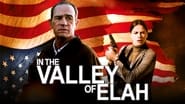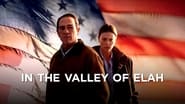Ray Waller
This is gonna have to take up some space in a way that some sites don't approve of, but just get ready to read. A director and writer like Paul Haggis cannot be meaningfully considered in a blurb or a broadside.First of all, where do people get the stones to carp that Paul Haggis' "In the Valley of Elah" is 'slow' or 'heavy handed' or 'plodding' (some of the comments I have heard from 'movie' lovers, and some of which have been made at this site)? Paul Haggis does not make 'high octane fueled thrill rides', he makes films."Valley..." actually moves along at scene level at a brisk cinematic pace. The reality is that if you are a shallow viewer you will miss the meaning beneath the surface of individual scenes that seem completely ordinary or mundane. That abiding attention to the mundane is no doubt where viewers get the idea that what they are watching is 'plodding'.Haggis is one of our most gifted scenarists, screenwriters, and directors just in the technical sense, let alone his undeniable powers of narrative, theme, characterization, subtle conflict, and tone. Technically, his gift for writing brief yet meaningful scenes that accumulate in meaning and theme is very much on display in "Valley..." Mundane interior shots and mundane dialogue are centered but not the point.In a modicum of shots he enters a scene, focuses on only what moves the plot and conflict forward, and almost always exits one or two beats EARLY, sometimes providing only the merest hint of the point but always amplifying that point with the very next scene--accumulation as an art form similar to the work of Wes Anderson ("The Royal Tenenbaums", (2001).Thus, Haggis works in scene clusters, in which meaning accumulates across sequences while brevity in any single scene drives the plot forward, sometimes mercilessly fast. The result is an uncanny ability to cut and pare down his scenario to the barest economy (the demand of all commercial first release theatrical film--in extreme shallowness we call this 'movie making', such as "Iron Man", and when done meaningfully as in "Million Dollar Baby" we call it cinema and give it an academy award. He cuts and pares down while also creating a mounting revelation of meaning, character, plot, tension, conflict, suspense, and even of theme.The "Valley..." sequence in which the father arrives at his son's military base and exchanges dialogue with on-duty personnel who knew the missing son seems throw-away, boring, but is structured eloquently to move us through a mise-en-scene that tells us crucial things about the son's character, his life, his associations, and the poverty of his (and all the other soldiers') emotional life.That poverty is immediately revealed as a clue to something being serious askew; a mystery takes initial shape here, while throw-away dialogue reveals something missing beneath the surface of the perfunctory politeness being offered by soldiers the father questions. The father sees even that sparseness to have been apparently further denuded--important things are missing and the father's theft of the phone from his son's possessions is covered up by the distraction of a boring conversation with a duty officer.The specter of a mystery, of suspense, pops a little bud out of the background here, with both an economy of words and of shots in a brief sequence.Haggis' scenarios carry an almost specter-like idea of content--the thematic ghost in the commercial cinematic machine. The opening sequence of "Casino Royal" (2006) is an example. The simple draftsmanship of this writer-director, visual and thematically, is a gift to American cinema. He doesn't write frenetic, action packed 'movies'. He writes and directs films. His most commercial works, "Crash" (2004--writer), "The Next Three Days (2010--director), and "Million Dollar Baby" (2004--writer), offer master classes in compact scene design, sequence, and accumulated meaning.His TV script work alone ("Mr. Sterling" and "Family Law") are a blueprint for some of the best written and most terse, concentrated script writing that has influenced critically acclaimed TV convention, while, hey, let's just remember, he is the first writer-director in American film academy history to write Oscar-winning Best Picture screenplays in two consecutive years.I'll stop there. I wouldn't want to take up TOO much space.
jb_campo
In the Valley of Elah is a poignant film that deadpans its way to impact you. The cast list shows many people in the film, but in reality, this is a duet with Tommy Lee Jones and Charlize Theron, with some cameos by Jason Patric as the military agent, and Susan Sarandon as the mother. TL Jones is ex military all the way, and he EXUDEs ex-military in his demeanor, his talk, and his habits. He was also an MP, so he knows how to go about an investigation. His youngest son Mike was in the middle east and has returned home. Suddenly they receive a call that Mike is AWOL if he does not show up by the end of the weekend.Jones drives all night to the town where Mike's base is, and starts a search. He figures Mike is letting off some steam. What happens next shakes him, and his relationship with is wife, to its core. Jones maintains his military demeanor, while inside he's being ripped apart.This is a tour de force performance from Tommy Lee Jones, for which he received a nomination for an Academy award as best actor, along with a slew of other nominations. You can tell he loves his son deeply, but that he understands the stresses of the military. His emotions show that yep, perhaps he did stuff his son did. And sadly, maybe he even went down other paths that he just won't talk about to anyone. This film is a monument to the often silent love and respect between a father and a son, no matter what happens. It was fantastic to see this played out with such depth and economy of acting. Equally excellent was Charlize Theron. For once she was not pimped out to exude her womanhood. In fact, she was made to look like a regular person, which allowed her acting skills to pour out because she wasn't trying to look cool or act cool. She was just trying to act the part. She played the police officer who has no respect from her fellow male officers who constantly taunt or joke on her. Until she shows them how smart she really is. And later shows them how far ahead of them she read tragic events that they laughed at her for. As a single mother, she's reliving almost the young Mike of TL Jones, and learning about the bond between a mother and her son, and how that too is important. The father being gone it seems.In the Valley of Elah is not quick paced. There's not a lot the happens. The story is even pretty simple. But the acting, wow, it's terrific. Susan Sarandon as the mother hits all the right notes too. I won't rate this a must-see, but it's pretty darn good if you want a film that examines the complicated combination of the military mixed with a father/son relationship that gets strained, but never broken, and eventually, albeit sadly, uplifted. Enjoy.
Aglaope
This movie deals with the serious business of war and what it does to people.It also deals with the anguish of parents, and how they try to deal with loss. When all is gone and there seems no point carrying on.As well as this there is the military and how it deals with its image and the fragility of the men it must use.The ex military father tries to find the truth behind his sons death. Despite him feeling he could do a better job than the police. Even he is caught out by the truth.The movie is slow, and serious, and even disturbing at times. However, it always keeps you interested, and is a good watch; if you are in the right mood for it.
denvergrown303
This movie is SO boring! The plot has some intense moments, but mostly just long awkward silences with the actors staring at each other with blank stares or doing the thousand yard stare off into the distance. The score for this film is like 4 keys on a piano played at a snails pace. Ding.... bomm.....ding.... bomm..... If I hadn't drank a cup of coffee I would have fallen asleep watching this movie. This movie really is 2 hours of long pointless periods of emptiness, interspersed with slow conversations. I can appreciate a pause for effect as you reveal another revelation in the plot, but this is too much. They walk into a restaurant, pause as the camera pans for 60 seconds. They walk out into the parking lot and sit in the car. Stare off into the distance for 30 seconds. There's nothing to digest, no plot development, just them sitting there.... not talking... The pace was so slow it was actually annoying. Unless you have nothing better to do with your time, and you've already watched every other movie, you should pass on this one.







